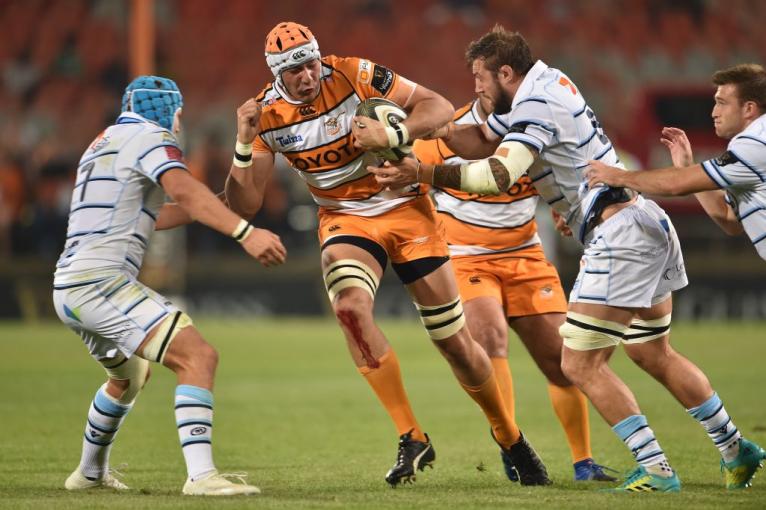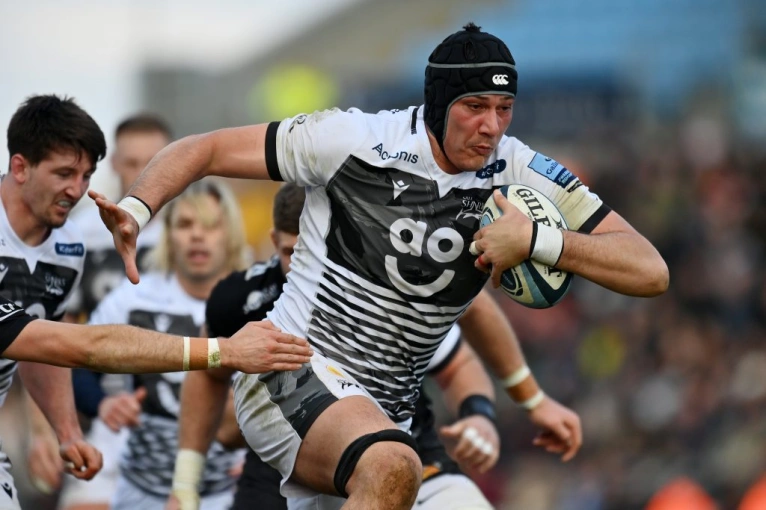Franco Smith is not known for exaggeration, so when the Glasgow coach talks of ‘miracles’, he’s not engaging in some tortured hyperbole.
A devout Christian, ‘miracle’ was Smith’s descriptor of choice for the remarkable recovery of JP du Preez, the 6ft 10ins lock forward invalided out of Glasgow duty for 650 days. Du Preez’s comeback story is the stuff of Hollywood feelgood: trauma, anxiety, grit, and eventually, salvation.
Nearly two years passed without the South African playing a match, between the Challenge Cup final in May 2023 and a URC fixture against the Ospreys on 1 March 2025. Du Preez suffered the kind of unfortunate friendly fire most rugby players face if they play for long enough. Foot trapped in a ruck of bodies at training; leg going one way, gargantuan frame the other. Knee ligaments and meniscus blown.
Three months into his rehab, Du Preez was lifting in the gym and running short distances without incident. When he tried to change direction, though, pain radiated sharply from his affected joint.
Further scans revealed a defect in his femur caused by the injury. He sat in a Scotstoun treatment room while this news was delivered, the reality of his predicament striking him like a freight train. If Du Preez wanted to prolong his rugby career, he’d need a donor and a perfectly sized fragment of bone to fix the damage.
“I was a bit soppy when I was told,” he says. “It was heartbreaking. We have family back home, it’s just me and my wife and my boy here, and I’m just here for the purpose of playing for Glasgow Warriors. To not be able to do that, and to be away from family, broke me a lot.
My physio called me back in and said ‘listen here, this is a ride or die case, this will make you or break you’.
“My physio called me back in and said ‘listen here, this is a ride or die case, this will make you or break you’. I went back home, had a chat to my wife, and we said we were going to go forward with this operation. If it didn’t work then I knew I’d given it my all.”
Going forward didn’t just mean more time under the knife or more months of arduous rebuilding, it meant finding a chunk of femur to start the process. Given Du Preez’s sheer height, that was no formality. He had little choice but to wait and hope the phone rang. Two months later, it did.
“Because I’m a tall lad, the doctors said we actually needed to get a perfect fit. My femur is quite big, so it was literally a waiting process and I was on standby, so anything could happen in the next minute, or hour, or the next day.
“They drilled out a piece of my femur and put the donor’s bone in there. If it didn’t take, my rugby career was done.
“The weird thing is, the surgeon said when he got the bone, it fit perfectly into my femur. He said he took a hammer, tapped it in, and it stayed in place, no gaps. A few months later, I started playing.”

Reintroducing a body of this scale to collision sport is complex in itself. Du Preez could still gym hard and strengthen the muscles around his knee. Straight-line running was okay too, just not with the usual kit at a physio’s disposal.
“We tweaked a few things,” he says. “We have an anti-gravity treadmill, and it’s giving me errors the whole time because of the length of my legs, so we needed to adjust there by running in the swimming pool. The purpose was the same.”
The URC final was a kaleidoscope of emotions. The euphoria of Glasgow’s success on the Highveld. The confronting reality that Du Preez could play no part in it, and was still many months from a return to play. He watched the Warriors sink the Bulls from Scotstoun with his team-mates and their families.
Our first neighbourhood was quite dangerous – shootings in the street, people trying to steal stuff out of our garages.
“Everyone’s partners and kids were here at the club. I said to my wife, ‘let’s come and watch it here’. It was quite emotional for me. I wanted to contribute to it, now I’m struggling with the knee, so my wheels were spinning in my head a bit.
“But I knew, as Franco said, everything happens for a reason and winning a championship is not something that happens in a year or two, it’s something that started three years ago and we ended up winning it. Everyone knows how to win it. I believe we can do it again.”
Du Preez’s quest for fitness was all the more pressing when you consider his past. Raised by the East Rand of Johannesburg, crime and criminals were always on the periphery of his childhood years.
“Our first neighbourhood was quite dangerous – shootings in the street, people trying to steal stuff out of our garages. My dad said, ‘no, we are going to move to a different place and a bigger house.’”
He played for the Lions, his local franchise, and moved to the Cheetahs, Smith’s Free State heartland where the Glasgow coach was working. Du Preez and his wife were happy in Bloemfontein, then covid struck. The Cheetahs slashed wages and the Du Preezes saw financial and social stability in the UK. He signed for Sale and when the couple welcomed baby Izak, resolved to stay on these shores.

“The reduced money at the Cheetahs wouldn’t have been enough to survive. I knew that was the time to leave. We packed our bags and went to Manchester. We actually got married to get my wife onto my working visa.
“My boy came along, and I said to my wife, I want to say in the UK to give him a bright future. The stuff that happens back in South Africa – all the crime and murders – I want to open up doors for my boy when he gets older.
“There are parts of South Africa which are quite dangerous with gangsters, poverty, people stealing cars to get food in their bellies. There is a good side. Safaris, Cape Town with the beautiful Garden Route, Table Mountain. There’s a fun part, you have your hunting, you go and fish, you have a braai and drink your brandies and eat your meat, see your family every weekend.
“Then there are places like Mitchells Plain [a Cape Town suburb] where if you go in there, you can be shot. Electric fences, alarm systems running over your yard for movement, sometimes your dog will trigger it. Slamming doors, safety doors out front.
“Every place has its pros and cons and that was our ‘normal’. But now, I need to think about my boy. It’s not me I’m worried about, it’s my wife and son. My perspective changed totally when we had Izak.”
I really do believe in miracles – that was one of them. I feel my knee is perfect now. No pain.
At 30, Du Preez is in the autumn of his career. He is also coming out of contract. Smith has had a bit to say about Scottish Rugby’s increasingly voracious appetite for recruiting Scottish-qualified projects. You get the sense he’d rather sprinkle a little more like-minded overseas talent to balance his squad.
“We said we want to stay in the UK to get citizenship for my boy,” Du Preez says. “We do have a plan B but we want to stay in the UK, and hopefully my agent is busy operating in the dark rooms!”
Mercifully, Du Preez is playing regularly again. He’s managed six games now, starting two of them. Glasgow celebrated his comeback match loudly, even though they blew it at the end against a gunslinging Ospreys side.
Smith calls the whole thing a miracle. Du Preez – like his boss, a man of staunch faith – has a similar take.
“I really do believe in miracles – that was one of them. I feel my knee is perfect now. No pain.
“The day of the Ospreys game was amazing. It felt like the process for my knee was actually short. I know it sounds weird. It felt like yesterday I got injured, and now I’m fixed again.
“To play with the boys again, doing what we love, was special. I will never take it for granted. I want to play every single game as if it’s my last.”










